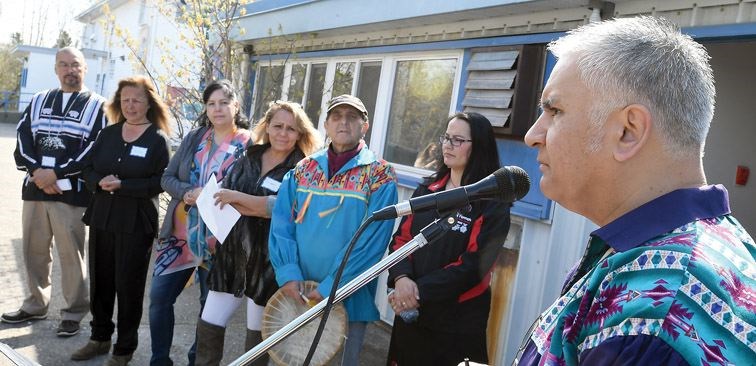The oldest of the area's cultures is now the newest of the area's arts organizations, and in the same way that mainstream culture and Indigenous culture has become inter-layered, the fresh group is wrapped in an established one.
The Northern Indigenous Artists' Collective (NIAC) was launched this week, independent of but supported from within by the Community Arts Council (CAC).
It has its own office, common space and display gallery at the Studio 2880 arts complex where the CAC is headquartered. But instead of being just a user group under the CAC roof, this group was born from the Community Arts Council's executive.
Ivan Paquette is the conduit member of the two groups. After seven years on the CAC board, taking on the role of aboriginal liaison, he was instrumental in drawing together a family of other artists to steer the creation of this stand-alone partner agency.
"As far as we can find, NIAC will be the first aboriginal arts council in B.C.," said CAC executive director Sean Farrell.
The steering committee is currently comprised of Shirley Babcock, Darin Corbiere, Carla Joseph, Lynette La Fontaine, Dianne Levesque, Len Paquette and Jennifer Pighin with Ivan Paquette's hands-on help and Kim Stewart earlier in the process.
As a group they issued a statement about their mandate.
"The founding members of the Northern Indigenous Artists' Collective feel strongly that the time is now for Indigenous artists to stand up and ensure that there is fair and stable support for Indigenous artists in both the urban and rural areas of the northern region of B.C. Individually and collectively we have all experienced challenges and vulnerabilities that exist in the marketplace and that tend to be unfavourable for many Indigenous artists. We look forward to finding ways of improving this situation, in the spirit of the calls-to-action of the Truth and Reconciliation Commission, to create an Indigenous arts industry in Northern British Columbia where all Indigenous artists feel welcomed, supported and valued."
It is already working, according to its newest member. Corbiere is Anishinaabe and recently moved here from Ontario.
"My artistic endeavours have taken off, with the help of this group," he said. "They adopted me and I appreciate the opportunity to be here on this land."
"What really drives us is community," said Pighin. "These things (making art, improving art skills and marketing the art) are hard to do when you are isolated."
"We expect to see our numbers grow dramatically," said Joseph, as Aboriginal artists come to learn of NIAC's existence.
Len Paquette spoke of the Two Rivers Gallery taking him under their wing to demonstrate his master carving activities, and how that kind of partnership becomes easier to forge and stronger to radiate if a concerted group effort is behind it.
"It's for the benefit of all people, not just artists," he said, as an eagle was spotted soaring above the inauguration. "I'm the richest man in the world, because I have culture."
He then strongly sang a pair of songs in his language, accompanying himself on the hand drum.
Ivan Paquette closed the proceedings with an original song accompanied on acoustic guitar, celebrating how the committee was now a board within another board, all cultures and all forms of artist all pulling together.
"There's nothing happening like this in all of British Columbia," he said.
"Prince George has a reputation for starting things the rest of the province, the rest of the country, want a piece of. P.G. is amazing. It's the soul of the province."
Anyone wishing to join NIAC need only be of aboriginal descent and send an email of introduction (send that to [email protected]). Information is available at www.niacpg.ca, call 250-563-2880 or drop in to visit the Studio 2880 complex at 2880 15th Ave.



